|
|
|
Sort Order |
|
|
|
Items / Page
|
|
|
|
|
|
|
| Srl | Item |
| 1 |
ID:
108533
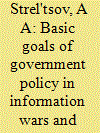

|
|
|
| 2 |
ID:
164208
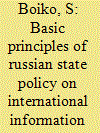

|
|
|
|
|
| Summary/Abstract |
National Security Strategic Planning Documents on the Basic Principles of Russian State Policy in the Field of International Information Security
ON JULY 24, 2018, it was five years since the approval by the president of the Russian Federation in 2013 of a key strategic planning document in the sphere of national security called Basic Principles of State Policy of the Russian Federation in the Field of International Information Security to 2020.1 Ensuring international information security in today's conditions of unprecedented increase in information security threats is of primary importance for achieving national security. This conclusion is confirmed by the provisions of the main strategic planning document in the area of security, the National Security Strategy of the Russian Federation as approved by Presidential Decree No. 683 of December 31, 2015,2 and by a number of other similar documents.
|
|
|
|
|
|
|
|
|
|
|
|
|
|
|
|
| 3 |
ID:
132215
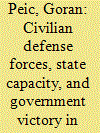

|
|
|
|
|
| Publication |
2014.
|
| Summary/Abstract |
Given the onset of a violent rebellion by an armed non-state group, how do states re-establish intra-state peace and hence fulfill their basic function as providers of internal security? In this article I argue that one way governments perform this core function is by recruiting non-combatants into local self-defense units called civilian defense forces (CDFs). By providing for local security, leveraging their superior local knowledge, and provoking insurgent reprisals against civilians, CDF units facilitate the influx of tactical intelligence as well as isolate insurgents from non-combatant populations physically as well as politically. Consistent with the argument, statistical analyses of two different cross-national data sets of insurgencies from 1944 to 2006 reveal that a state is 53 percent more likely to vanquish a guerrilla threat if the incumbent deploys CDFs. The analyses also cast doubt on a recent claim in the literature that incumbent force mechanization adversely affects the states' ability to counter insurgent threats. Given that CDF deployment is a more easily manipulable variable than most other elements of state power, CDFs appear to be an effective instrument of counterinsurgency deserving of further academic and policy attention.
|
|
|
|
|
|
|
|
|
|
|
|
|
|
|
|
| 4 |
ID:
114226
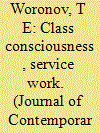

|
|
|
|
|
| Publication |
2012.
|
| Summary/Abstract |
This essay discusses an interesting paradox forming in urban China today. Using a Weberian framework, it argues that recent changes in state policy, educational structures, and forms of social status are producing new social classes. Yet at the same time, the very processes and policies that enable these new class formations also mitigate against the development of class consciousness. Based on a year of ethnographic research in two vocational secondary schools in Nanjing, this essay looks closely at the ways in which young people who are preparing to enter the lower echelons of the urban service economy are potentially part of a new social class, but one with very limited potential to develop class consciousness.
|
|
|
|
|
|
|
|
|
|
|
|
|
|
|
|
| 5 |
ID:
132495
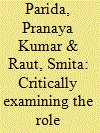

|
|
|
|
|
| Publication |
2014.
|
| Summary/Abstract |
Each day, natural disasters such as ?oods, earthquakes and hurricanes/ cyclones threaten human life and cause severe environmental losses around the world. During the last decade, disasters have affected the lives and assets of almost 2.4 billion people across the world (OCHO, 2010). In India alone since the year 2000, an average 65 million people have been affected by disasters every year. Of this, 8.45 million have been children under the age of ?ve and 3.25 million are pregnant and lactating mothers (UNICEF). Such
humanitarian crises often set back the developmental gains of lesser developed regions by several" decades. Not only do disasters lead to the loss of life and property, but "the immediate a?ermath is a complex situation complicated by issues of logistics, search and rescue, relief distribution, limited accessibility to some of the affected areas, the threat of secondary disasters, the mostly well-intentioned interests of diverse stakeholder groups (which many a times are external to the context of thedisaster), the in?ow of aid material and grants, political interest, media interest and often limited administration capacity. Government is responsible for administrative arrangements dealing with disasters.- Effective policies play a vital role in mitigating the impact of disasters and reducing likely losses of life and property ( Erramilli, 2008) . The disaster management, which is not being treated as a sector by itself, is
undergoing major changes, especially at the institutional and policy levels, which are prompted by various. macro-level factors ( Wagle and Warghade, 2006). Effective coordination among various stakeholders, specifically the Government, the international community and nongovernmental organizations (NGOS) in the aftermath of a disaster is critical to, among other things, a minimization in disaster response time, the proper allocation of resources and the avoidance of duplication of response efforts; Moreover, as economic growth and sustainable development are essential to successful disaster preparedness and mitigation efforts, effective coordination has the potential to strengthen the link between emergency response, preparedness and long-term development strategies.
|
|
|
|
|
|
|
|
|
|
|
|
|
|
|
|
| 6 |
ID:
132497
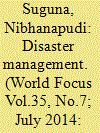

|
|
|
|
|
| Publication |
2014.
|
| Summary/Abstract |
Hundreds of Natural disasters take place worldwide every year causing irreparable damage to life and property. Earthquakes, ?oods, typhoons, hurricanes,- Tsunamis are among the worst of these natural disasters. Over the last few decades, there has been an alarming increase in the occurrence of natural disasters and the magnitude of their social, economic and environmental impact. During any natural disaster it is usually the" children who suffer the most. The nation witnessed the death of nearly a thousand children during the 2001 Bhuj earthquake. Out of them, 300 died while marching for the Republic day parade. They were in a narrow lane when the earthquake hit causing buildings onboth sides to collapse. It is said thatpnearly 1,884 school buildings collapsed leading to a loss of 5,950 class rooms. About 12000 schools suffered damages making them un?t for children to continue their studies. Fire tragedies, like the one in Kurnbakonam killed 93 children in a school. Another ?re accident in Dabwali, Haryana where a ?re broke out during a schoolfunction took he lives of many school children. Children in schools are the 'most vulnerable group during any disaster. These tragedies reiterate the need for all of us to sit up and think about the safety of these children. It is necessary to make schools safe and hazard proof. For this purpose, it is important to have disaster management, emergency preparedness and response plans at school level.
|
|
|
|
|
|
|
|
|
|
|
|
|
|
|
|
| 7 |
ID:
127792
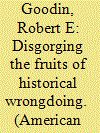

|
|
|
|
|
| Publication |
2013.
|
| Summary/Abstract |
There are many different ways of responding to wrongdoing: person-centered or object-centered, victim-centered or perpetrator-centered, and fault-oriented or not. Among these approaches, requiring innocent beneficiaries to disgorge the fruits of historical wrongdoings of others is attractive because it is informationally the least demanding. Although that approach is perhaps not ideal, at least it is feasible where other responses are not, and doing something is better than doing nothing in response to grievous historical wrongdoing. Depending on circumstances, disgorgement can be in whole or in part, in kind or in cash. Even without the full information that disgorgement itself requires, general redistributive taxation might be justified as a tolerably close approximation.
|
|
|
|
|
|
|
|
|
|
|
|
|
|
|
|
| 8 |
ID:
128868


|
|
|
|
|
| Publication |
2014.
|
| Summary/Abstract |
How important is ideology for the analysis of civil war? In contrast to literature that neglects ideology in its emphasis on structural variables or situational incentives, this article argues for the recognition of its essential role in the functioning of armed groups if they are to explain observed variation in armed group behavior. For example, sidelining ideology leaves major phenomena unexplained, including both mass killing and restraint in violence against civilians. Ideology is defined as a set of more or less systematic ideas that identify a constituency, the objectives pursued on behalf of that group, and a program of action (perhaps only vaguely defined). Ideology matters in two ways. First, it has instrumental value for armed groups, socializing combatants with heterogeneous motivations into a coherent group, dampening principal-agent problems, prioritizing competing goals, and coordinating external actors including civilians. Ideologies differ in the kind of institutions and strategies they prescribe for meeting these challenges and in the extent to which they do so. Yet this first approach is incomplete, as ideology has more than instrumental value. Members of some armed groups act on normative commitments in ways not reducible to instrumental reasoning, and some groups constrain their strategic choices for ideological reasons, often normative concerns prescribed by their ideology. Some groups, for example, engage in restraint, declining to use violence though it would have strategic benefit. The conclusion lays out a twin-fold research agenda: a 'weak program' that analyzes the instrumental adoption of ideology and a 'strong program' that explores normative commitments based on particular ideologies and on social preferences.
|
|
|
|
|
|
|
|
|
|
|
|
|
|
|
|
| 9 |
ID:
166322
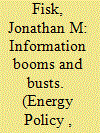

|
|
|
|
|
| Summary/Abstract |
Today's 'fracking debate' includes a familiar set of actors and arguments. Advocates of unconventional oil and gas production contend that it has contributed to an economic renaissance for many subnational governments and has improved American energy security. Opponents suggest that unconventional production is an environmental and public health hazard. One way that states are trying to balance the economic benefits of continued energy production with environmental protection is through the use of information disclosure requirements. Prior work notes that the rigor of state disclosure standards relative to unconventional oil and gas production vary. Through measures of association and exact logistic regression, this project expands the disclosure literature by focusing on three types of disclosure: pre-drilling notification, chemical disclosure during operations, and trade secret exemptions.
|
|
|
|
|
|
|
|
|
|
|
|
|
|
|
|
| 10 |
ID:
004527


|
|
|
|
|
| Publication |
New Delhi, JawaharLal Nehru Univ., 1994.
|
| Description |
40p.
|
|
|
|
|
|
|
|
|
|
|
|
Copies: C:1/I:0,R:0,Q:0
Circulation
| Accession# | Call# | Current Location | Status | Policy | Location |
| 035355 | 303.625/INT 035355 | Main | On Shelf | General | |
|
|
|
|
| 11 |
ID:
129674
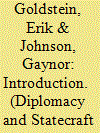

|
|
|
|
|
| Publication |
2014.
|
| Summary/Abstract |
This special issue of Diplomacy & Statecraft is in recognition of the contribution of Richard Langhorne to the fields of international history, diplomacy, and statecraft. He was a member of the founding Editorial Advisory Board of Diplomacy & Statecraft in 1988 and has served on that board for a quarter of a century, providing important guidance and notable contributions over many years. In his service to the scholarly world, beside his involvement with Diplomacy & Statecraft, Richard was one of the initial committee members of the British International History Group, of which he was the founding chairman and whose successful launch and in its early years he did much to ensure.
|
|
|
|
|
|
|
|
|
|
|
|
|
|
|
|
| 12 |
ID:
128971
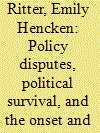

|
|
|
|
|
| Publication |
2014.
|
| Summary/Abstract |
Under what conditions will a state repress its citizens? The literature examining human rights violations lacks consensus over exactly how repression and dissent are interrelated. I argue that contradictions have arisen because scholars have not derived expectations consistent with modeling three common assumptions: (1) dissent and repression are causally interrelated (2) states and groups are in conflict over some policy or good and (3) authorities repress to remain in office. I develop a formal model based on these principles, and I predict that changes in the same independent variable can have divergent effects on the onset and severity of repression. Using coded event data for all states from 1990 to 2004 and a two-tiered estimator, I find that increases in executive job security decrease the likelihood that repression will occur in the first place, but increase the severity of observed violations.
|
|
|
|
|
|
|
|
|
|
|
|
|
|
|
|
| 13 |
ID:
097343


|
|
|
|
|
| Publication |
2010.
|
| Summary/Abstract |
As climate change mitigation gains attention in the United States, low-carbon energy technologies such as wind power encounter both opportunities and barriers en route to deployment. This paper provides a state-level context for examining wind power deployment and presents research on how policy stakeholders perceive wind energy in four states: Massachusetts, Minnesota, Montana, and Texas. Through semi-structured interviews, state-level energy policy stakeholders were asked to explain their perceptions of wind energy technology within their state. Interview texts were coded to assess how various drivers promote or hinder the deployment of wind power in sub-national contexts. Responses were dominated by technical, political, and economic frames in all four states, but were often driven by a very different rationale. Environmental, aesthetic, and health/safety frames appeared less often in the discourse. This analysis demonstrates that each state arrived at its current level of deployment via very different political, economic, and technical paths. In addition to helping explain why and how wind technology was - or was not - deployed in each of these states, these findings provide insight into the diversity of sub-national dialogues on deployment of low-carbon energy technologies.
|
|
|
|
|
|
|
|
|
|
|
|
|
|
|
|
| 14 |
ID:
138186
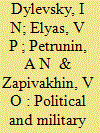

|
|
|
|
|
| Summary/Abstract |
The authors look at the political and military aspects of the Russian Federation's state policy on international information security and the guidelines to be followed to counter military and political threat of aggressive use of information and communication technologies.
|
|
|
|
|
|
|
|
|
|
|
|
|
|
|
|
| 15 |
ID:
128210
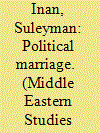

|
|
|
|
|
| Publication |
2014.
|
| Summary/Abstract |
Under the influence of popular history, recent historiography on the Ottomans has focused mainly on such subjects as the influence of women on politics and indirectly on issues of the harem. However, such a focus indicates limited information and an insufficient number of studies on the sons-in-law in the dynasty of the late Ottoman state. The purpose of this article is to develop a theoretical framework concerning sons-in-law in the dynasty of the late Ottoman state period by collating the related but limited references in the historical sources. In this context, such issues as the policy of marriage in the Ottoman dynasty, the status of the dynasty sons-in-law, and the privileges they had are studied in terms of the late period of the Ottomans. Thus, the study's major purpose is to discuss the late Ottoman history in the light of such an important but ignored subject.
|
|
|
|
|
|
|
|
|
|
|
|
|
|
|
|
| 16 |
ID:
149958
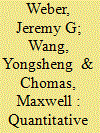

|
|
|
|
|
| Summary/Abstract |
We provide a quantitative description of state-level taxation of oil and gas production in the continental U.S. for 2004–2013. Aggregate revenues from production taxes nearly doubled in real terms over the period, reaching $10.3 billion and accounting for 20% of tax receipts in the top ten revenue states. The average state had a tax rate of 3.6%; nationally, the average dollar of production was taxed at 4.2%. The oil-specific rate estimated for the study period is $2.4 per barrel or $5.5 per ton of carbon. Lastly, state-level tax rates are two-thirds higher in states excluding oil and gas wells from local property taxes, suggesting that the policies are substitutes for one another.
|
|
|
|
|
|
|
|
|
|
|
|
|
|
|
|
| 17 |
ID:
109420


|
|
|
|
|
| Publication |
2011.
|
| Summary/Abstract |
We examine how state-level factors affect greenhouse gas (GHG) reduction policy preference across the United States by analyzing climate action plans (CAPs) developed in 11 states and surveying the CAP advisory group members. This research offers insights into how states approach the problem of choosing emissions-abatement options that maximize benefits and minimize costs, given their unique circumstances and the constellation of interest groups with power to influence state policy. The state CAPs recommended ten popular GHG reduction strategies to accomplish approximately 90% of emissions reductions, but they recommended these popular strategies in different proportions: a strategy that is heavily relied on in one state's overall portfolio may play a negligible role in another state. This suggests that any national policy to limit GHG emissions should encompass these key strategies, but with flexibility to allow states to balance their implementation for the state's unique geographic, economic, and political circumstances. Survey results strongly support the conclusion that decisions regarding GHG reductions are influenced by the mix of actors at the table. Risk perception is associated with job type for all strategies, and physical and/or geographic factors may underlie the varying reliance on certain GHG reduction strategies across states.
|
|
|
|
|
|
|
|
|
|
|
|
|
|
|
|
| 18 |
ID:
091623
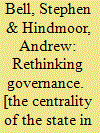

|
|
|
|
|
| Publication |
Cambridge, Cambridge University Press, 2009.
|
| Description |
xv. 234p.
|
| Standard Number |
9780521712835
|
|
|
|
|
|
|
|
|
|
|
|
Copies: C:1/I:0,R:0,Q:0
Circulation
| Accession# | Call# | Current Location | Status | Policy | Location |
| 054476 | 320.1/BEL 054476 | Main | On Shelf | General | |
|
|
|
|
| 19 |
ID:
131514
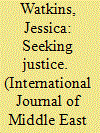

|
|
|
|
|
| Publication |
2014.
|
| Summary/Abstract |
In Jordan, tribal dispute settlements have played a Pivotal Role in the management of various types of grievances between individuals since long before the establishment of the modern state. To varying degrees, Jordanians-from the East and West Banks, Muslim and Christian, urban and rural-cherish the kinship networks associated with these procedures, and the ?a?wa (truce) and ?ul? (reconciliation) processes remain time-honored mechanisms for preventing revenge and making amends for wrongs committed. However, under the state's influence, the purpose of observing tribal settlements is evolving within an increasingly heterogeneous society. Drawing on documentary analysis combined with ethnographic material from across the kingdom, this article investigates the current status of tribal dispute resolution traditions among different sectors of the population. I argue that observance of such traditions can signify conformity with the hegemonic values that the state promotes as well as resistance to aspects of state control.
|
|
|
|
|
|
|
|
|
|
|
|
|
|
|
|
| 20 |
ID:
181144
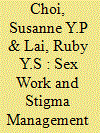

|
|
|
|
|
| Summary/Abstract |
This paper examines the impacts of state policies and NGO advocacy on female sex workers’ identity and how they manage stigma. Comparing three groups of sex workers – those born and working in mainland China, those born and working in Hong Kong, and those born in mainland China who later migrated to Hong Kong and entered the sex industry – this paper suggests that differences in state policies on prostitution and the different degrees of visibility of NGOs campaigning for sex workers’ rights are related to three strategies used by sex workers to construct a positive self-image to counteract the stigma they face: gendered obligation fulfilment, professional work and responsible citizenship. The paper illustrates that stigmatized-identity management involves complex relationships among individual interpretation, selection and mobilization of gender, work and citizenship scripts, which are contingent on structural features of the environment and may change during migration and relocation.
|
|
|
|
|
|
|
|
|
|
|
|
|
|
|
|
|
|
|
|
|